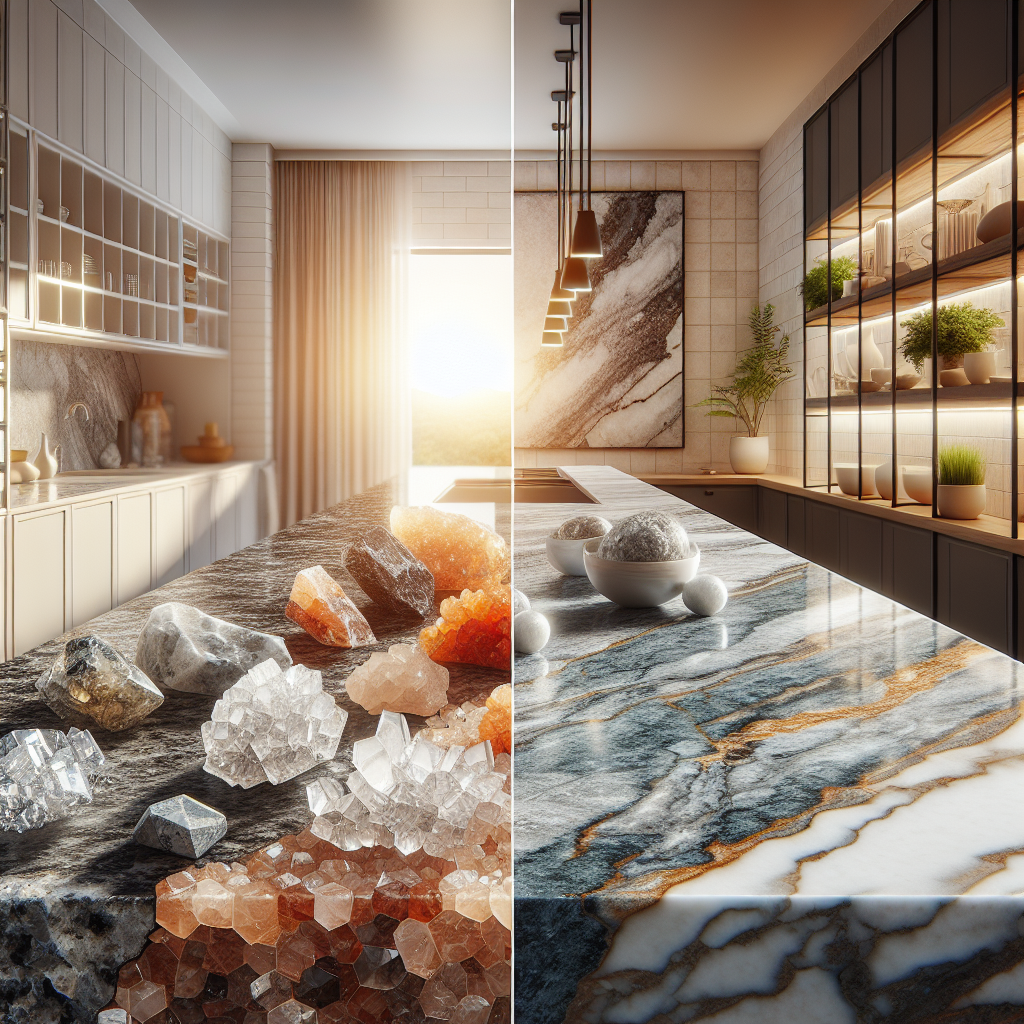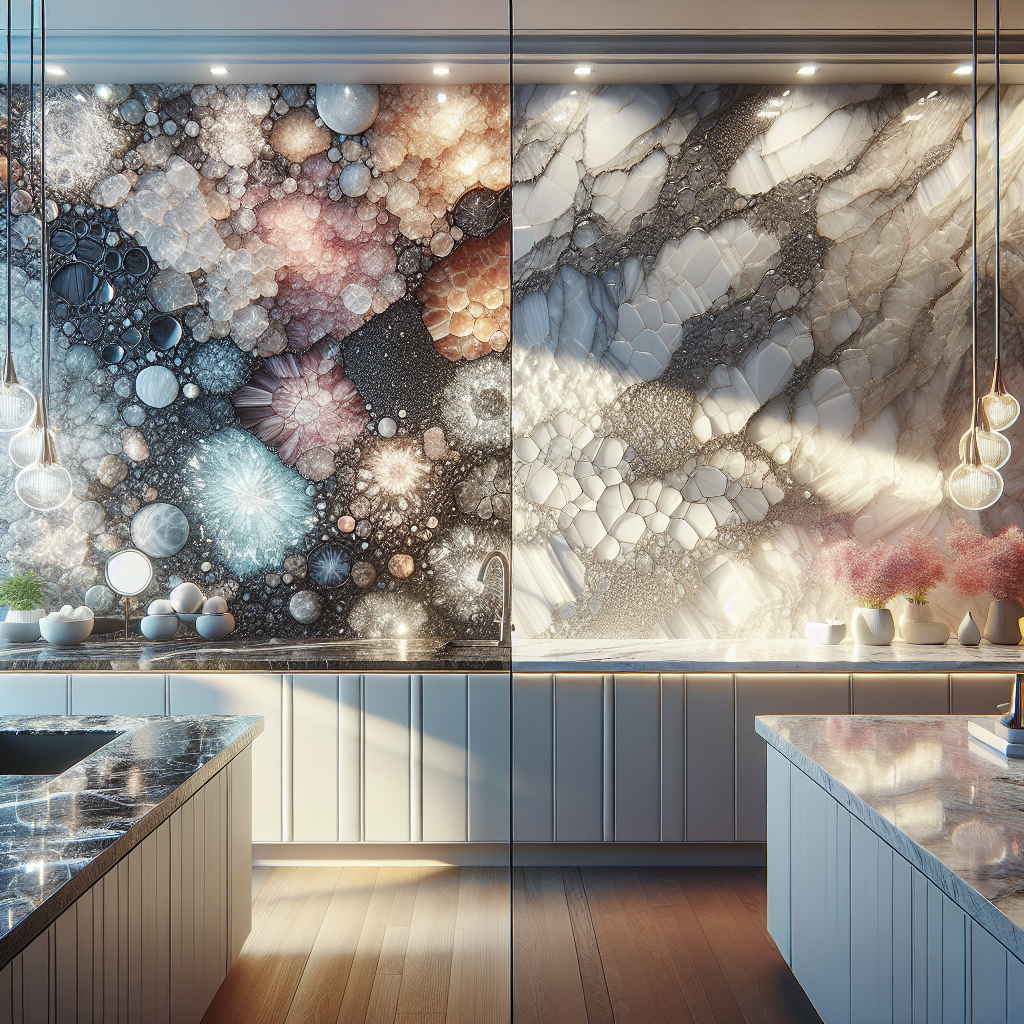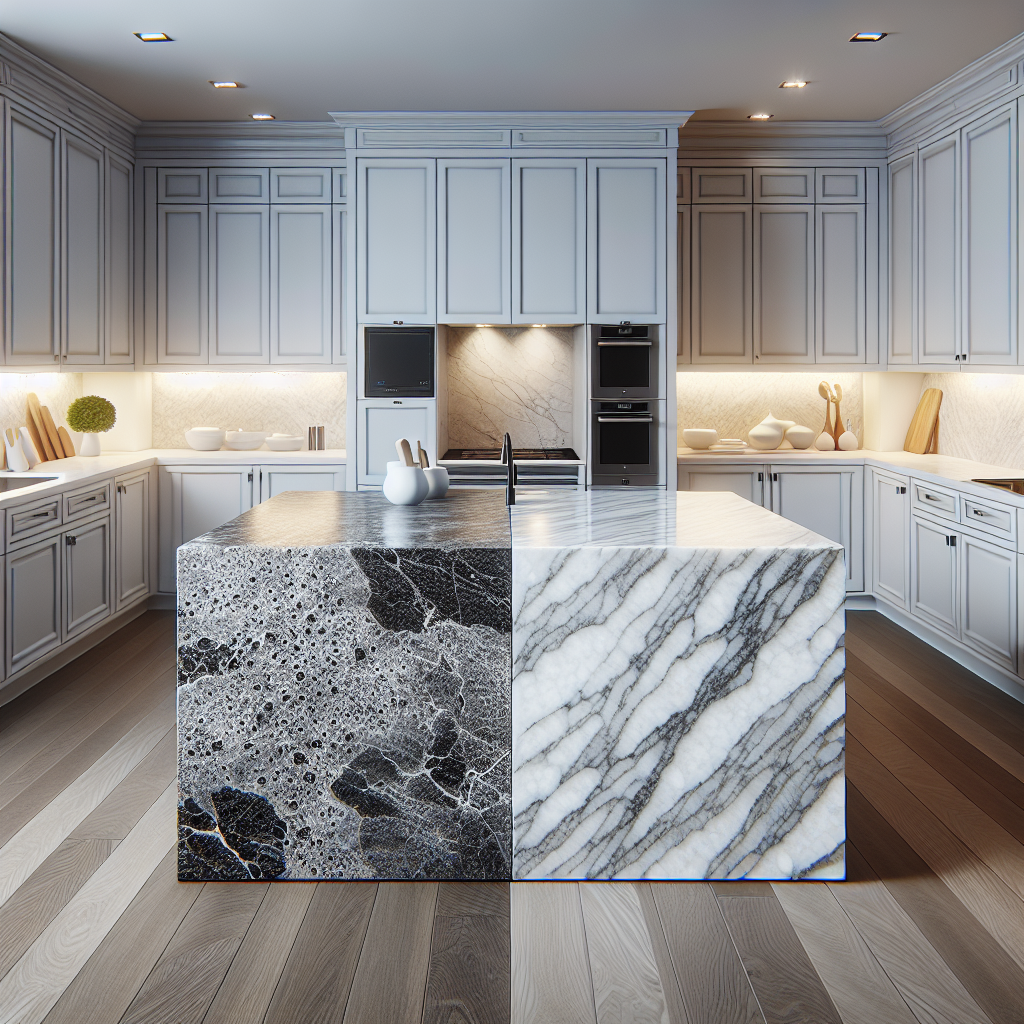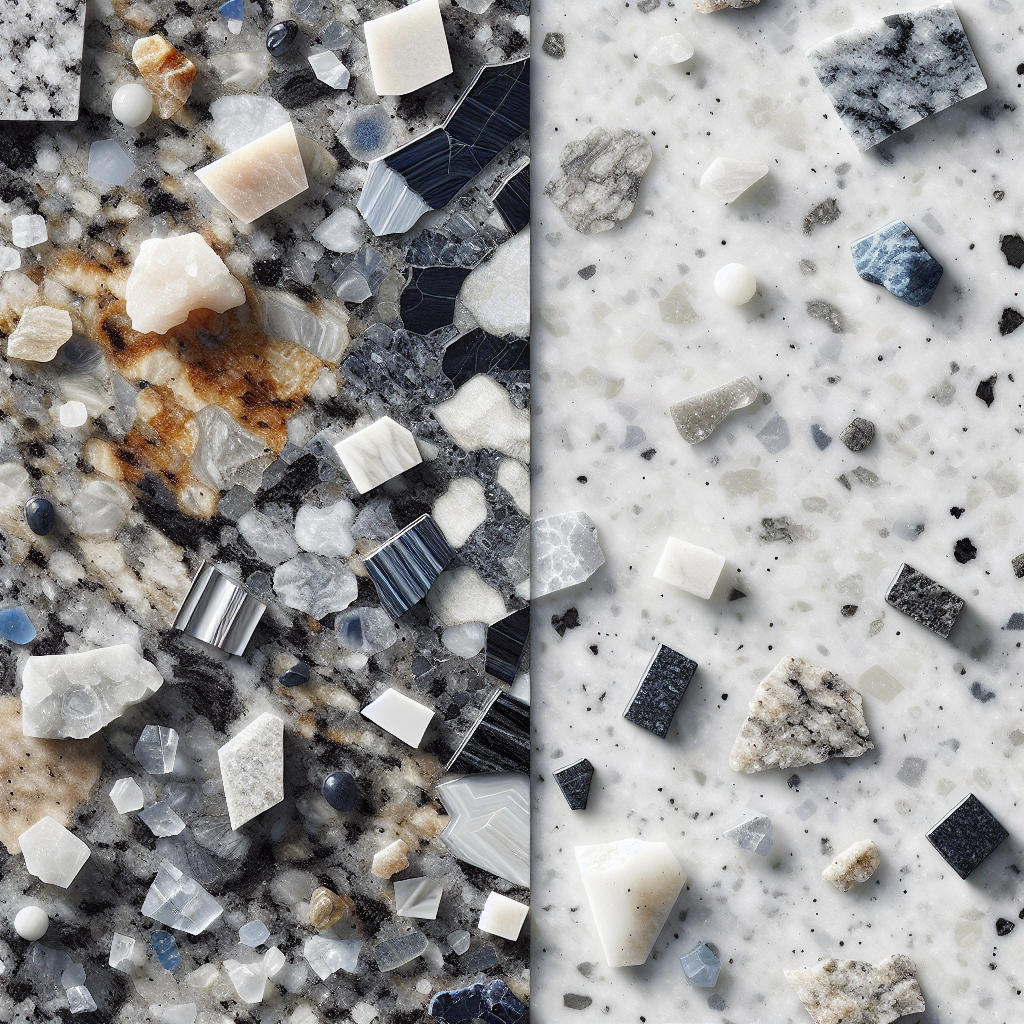When it comes to choosing the perfect countertop material for your home, durability is often at the top of the list of considerations. Granite and quartz are two of the most popular choices for homeowners seeking a blend of aesthetic appeal and long-lasting performance. But which is more durable: granite or quartz? To answer this question, we must delve into the properties and characteristics that each material brings to the table.
Granite is a natural stone formed from the cooling and solidification of magma beneath the Earth’s surface. Its natural origins give it unique patterns and colors, making each slab one-of-a-kind. Granite is well-known for its hardness and resistance to heat, scratches, and stains, making it an excellent choice for kitchen countertops where high durability is essential.
On the other hand, quartz countertops are engineered from natural quartz crystals combined with resins and pigments. This manufacturing process results in a non-porous surface that is incredibly resilient. Quartz is renowned for its uniform appearance and a wide variety of colors and patterns, offering versatility in design options while maintaining high levels of durability.
Choosing between granite and quartz can be challenging, but understanding their respective strengths and how they align with your needs is crucial. As we explore further, we will compare these materials in various aspects to help you make the best choice for your home.
Call us today at (954) 781-7370 for a free quote!
Comparing Granite and Quartz Composition

The composition of granite and quartz significantly influences their durability and overall performance in your home. Understanding these differences can help clarify which material might be better suited for your specific needs.
Granite is an igneous rock composed primarily of quartz, feldspar, and mica. These minerals are naturally occurring and are mined directly from the earth, resulting in a material that is both hard and heat-resistant. Granite’s crystalline structure provides it with a unique aesthetic appeal, characterized by a range of colors and patterns. Each slab is distinct, offering a bespoke look for your kitchen or bathroom countertops. The natural formation process of granite contributes to its robustness, making it resistant to scratching and able to withstand high temperatures, which is ideal for busy kitchens.
In contrast, quartz countertops are engineered products made from approximately 90-95% ground natural quartz combined with polymer resins and pigments. This blend creates a highly durable and non-porous surface. The manufacturing process allows for a consistent appearance and a wide variety of colors and patterns, which can mimic natural stone or offer more uniform designs. The resins used in quartz countertops enhance their stain resistance and contribute to their overall strength, making them less prone to chipping and cracking compared to natural stone.
By examining the composition of granite and quartz, it’s clear that both materials offer unique advantages. Granite’s natural formation provides intrinsic strength and heat resistance, while quartz’s engineered composition ensures a uniform appearance and enhanced durability against everyday wear and tear.
Strength and Hardness of Granite vs Quartz

When assessing the strength and hardness of granite versus quartz, it’s essential to understand the scientific aspects that contribute to their durability. Both materials are renowned for their robustness, but they exhibit different characteristics that may impact their suitability for various applications in your home.
Granite is a natural stone that rates around 6-7 on the Mohs scale of mineral hardness. This scale measures the scratch resistance of various minerals through the ability of a harder material to scratch a softer one. Granite’s high rating indicates its substantial resistance to scratching, making it an excellent choice for kitchen countertops where sharp utensils and heavy cookware are frequently used. The interlocking crystal structure of granite adds to its overall strength, allowing it to support substantial weight without cracking or breaking.
Quartz countertops, being engineered from one of the hardest minerals on earth, typically rate slightly higher on the Mohs scale, around 7-8. The addition of polymer resins during the manufacturing process not only enhances quartz’s hardness but also makes it more flexible than granite. This flexibility can be advantageous, as it allows quartz countertops to resist chipping and cracking better under heavy impact. Additionally, the non-porous nature of quartz makes it highly resistant to stains and bacterial growth, further contributing to its long-lasting durability.
In summary, while both granite and quartz offer impressive strength and hardness, quartz generally edges out granite in terms of overall resilience and maintenance. Granite, with its natural beauty and heat resistance, remains a strong contender, especially for those who prefer a more traditional, organic look.
Resistance to Stains and Scratches
When it comes to resistance to stains and scratches, both granite and quartz have distinct properties that make them suitable for different lifestyle needs. Choosing the right material for your countertop can significantly impact its longevity and ease of maintenance.
Granite, being a natural stone, is inherently porous. This means that without proper sealing, granite can absorb liquids, leading to possible staining. Common kitchen substances like wine, coffee, and oils can penetrate the surface if spills are not promptly cleaned. However, once properly sealed, granite becomes significantly more resistant to stains. It’s recommended to reapply the sealant once a year to maintain its protective barrier. As for scratches, granite is quite durable and can withstand normal kitchen use, but it is not entirely scratch-proof. Using cutting boards and avoiding dragging heavy objects across the surface can help preserve its pristine condition.
Quartz, on the other hand, is engineered to be non-porous. This characteristic gives quartz an edge in stain resistance since liquids and spills do not penetrate its surface. Even without sealing, quartz countertops maintain their resistance to stains from substances like coffee, wine, or juice. Additionally, the engineered nature of quartz contributes to its remarkable scratch resistance. While it’s still advisable to use cutting boards to prevent any potential damage from sharp objects, quartz is generally more forgiving when it comes to everyday wear and tear.
In conclusion, if your priority is superior resistance to stains and scratches with minimal maintenance, quartz might be the better choice. Granite, while slightly more demanding in terms of upkeep, offers a unique and natural aesthetic that many homeowners find appealing.
Maintenance and Care for Granite and Quartz

Proper maintenance and care are crucial to ensure the longevity and beauty of your countertops, whether you choose granite or quartz. Each material has its own set of requirements to keep it looking its best.
Granite countertops require a bit more attention due to their natural porosity. To maintain granite, it is essential to seal the surface upon installation and reapply the sealant annually. This process helps to prevent staining and damage. Daily cleaning should be done with a mild dish soap and warm water, avoiding harsh chemicals and abrasive sponges that can damage the sealant. For tougher spills, using a pH-balanced cleaner specifically designed for natural stone is recommended. Additionally, it’s wise to use trivets or hot pads under hot pots and pans to prevent thermal shock, which can cause cracks.
Quartz countertops are known for their low maintenance due to their non-porous nature. They do not require sealing, making them a convenient option for busy households. Cleaning quartz is straightforward—simply use a mild detergent or a gentle all-purpose cleaner with a soft cloth. Avoid abrasive cleaners and pads, as they can dull the surface over time. Despite its durability, it’s still best to use cutting boards and trivets to protect against potential scratches and thermal damage. One of the unique advantages of quartz is its resistance to bacterial growth, making it an excellent choice for hygienic kitchen environments.
Ultimately, the choice between granite and quartz can come down to how much time and effort you’re willing to invest in maintenance. Granite offers a timeless, natural look with a bit more upkeep, while quartz provides a hassle-free experience with consistent performance.
Cost and Lifespan Considerations

When choosing between granite and quartz for your kitchen countertops, understanding the cost and lifespan considerations is essential to make an informed decision. Both materials offer unique advantages, but their price points and longevity can vary significantly.
Granite countertops typically range from $40 to $200 per square foot, depending on the quality, color, and origin of the stone. Installation costs can add to this price, making granite a substantial investment. However, with proper care and maintenance, granite countertops can last a lifetime. Their natural beauty and uniqueness can also add significant value to your home, making them a worthwhile investment for many homeowners.
Quartz countertops generally cost between $50 and $150 per square foot, also influenced by the brand, design, and installation fees. While often slightly more expensive than granite, quartz’s non-porous nature means lower maintenance costs over time. Quartz surfaces are engineered to be highly durable, with a lifespan that can rival granite’s. Additionally, the consistency in appearance and the variety of design options available make quartz a popular choice for those seeking a blend of beauty and practicality.
Ultimately, your decision may come down to budget and long-term value. Granite may offer a more affordable initial cost with timeless appeal, while quartz provides a low-maintenance, durable surface that justifies its higher price over time.
Call us today at (954) 781-7370 for a free quote! Explore our exquisite range of granite and quartz countertops to find the perfect fit for your home. Visit our website at Absolute Marble and Granite for more information.
